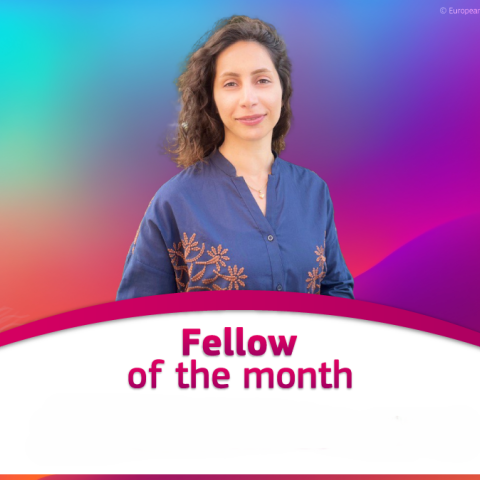- Published:
From Australia to Europe: Smart nanofibres for smarter cancer care
Our June MSCA ‘Fellow of the Month’ Dr. Fatemeh Mokhtari is using smart materials to help treat cancer and changing how we think about science along the way.

MSCA Fellow of the Month
Our first guest is Dr. Fatemeh Mokhtari, an MSCA postdoctoral fellow working at KU Leuven in Belgium on advanced biomedical devices using piezoelectric nanofibres.
The MSCA fellowship has been a transformative milestone in my research journey, enabling me to move from Australia to Europe,” says Fatemeh. “This opportunity allowed me to adapt to a new research culture, expand my expertise, and develop a strong interdisciplinary network across research groups.
From smart wearables to life-saving devices
Fatemeh completed her PhD in 2020 in materials engineering at the Intelligent Polymer Research Institute (IPRI) at the University of Wollongong, Australia. She pioneered the fabrication of piezoelectric fibres that can be processed by textile machines, enabling the development of smart wearables with diverse textile architectures and a focus on commercialisation.
After her PhD, she contributed to 2 industry projects on developing and embedding piezoelectric sensors into catheters for medical applications, and wearable sensors for hazardous workplace environments.
In 2022, Fatemeh was awarded the prestigious Alfred Deakin Postdoctoral Research Fellowship from Deakin University. At the Institute for Frontier Materials she advanced her research on piezoelectric fibres, aiming to use them in future devices such as cochlear implants to help people hear better and pacemakers to assist with heart health.
She also developed 2D materials to boost the performance of piezoelectric polymers in harvesting sound energy. This research led to the creation of high-performance, ultra-sensitive sensors for structural health monitoring.
New research, new continent, new goals
In 2024, Fatemeh was awarded an MSCA Postdoctoral Fellowship and travelled across the world to join the Department of Materials Engineering at KU Leuven University in Belgium.
Her current research focuses on smart drug delivery systems for cancer treatment by developing innovative materials for targeted therapy.
My research is about making super-thin threads called nanofibers, which are much thinner than a human hair. I create these fibres using a special machine that spins them really fast. These fibres are made from a unique material called piezoelectric polymer. This means the fibres can turn pressure or movement into electricity, kind of like a tiny power generator.
The best part is that these nanofibers can carry medicine inside them. When they get a little push or pressure from outside, like a special sound or vibration, the fibers release the medicine exactly where it is needed in the body - right at the cancer cells.
My MSCA fellowship helped me integrate my background in piezoelectric materials into the development of advanced biomedical devices, driving innovation and impact in the fields of drug delivery and cancer treatment. The MSCA’s strong focus on international mobility, collaboration, and knowledge exchange has been central to this growth. As a woman in science, it has been deeply meaningful to thrive in such an inclusive, supportive, and globally connected programme.
Giving back to science and society
Fatemeh is committed to contributing to the scientific community, evidenced by her significant contributions as a peer reviewer and editor. She is an active peer reviewer for ISI journals and has completed 221 reviews for 77 publications.
She is not only carrying out excellent science and ensuring the quality of research outputs, but she is also passionate about sharing her experiences and discoveries more broadly.
She shared her expertise on smart clothing in healthcare through international conferences and interviews with national media: UOW Stand Magazine, ABC Illawarra Radio, and Women’s Health Australia. Her insights were also featured in WTiN magazine and KU Leuven’s ConnectING magazine.
Explaining science like a superhero story
When asked how she would explain her research to a 10-year-old child or a curious neighbour, Fatemeh said:
My research is about making super-thin threads called nanofibers, which are much thinner than a human hair. This makes cancer treatment smarter, safer, more effective, and less painful. It could also help patients recover faster by targeting the cancer directly, like a superhero delivery system that knows where to go.
Staying connected through the MCAA
Fatemeh is a member of the Marie Curie Alumni Association (MCAA), which connects past and current MSCA fellows from around the world. The Association provides its members with career development services, mentoring support, advocacy opportunities, and micro-grants, to name a few examples.
I believe that curiosity drives progress, and the knowledge gained through this process becomes truly meaningful when shared within diverse and collaborative communities such as MCAA.
To me, science is not only about discovering answers, but also about working collectively to transform those answers into lasting, positive change that fosters a more equitable world. MCAA provides an ideal platform to support and amplify this vision.
More information
Connect with Dr. Fatemeh Mokhtari on LinkedIn
Subscribe to the MSCA Newsletter


